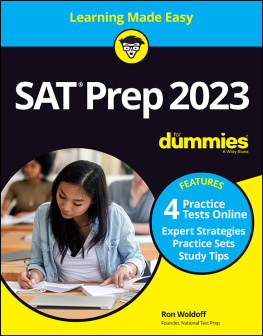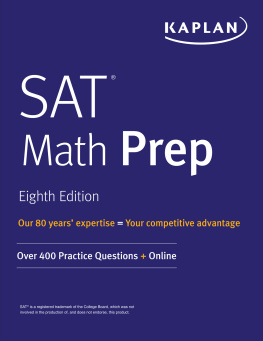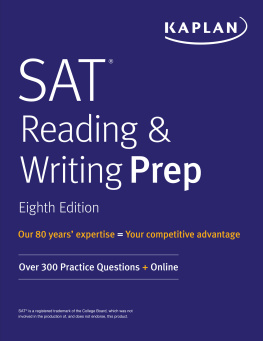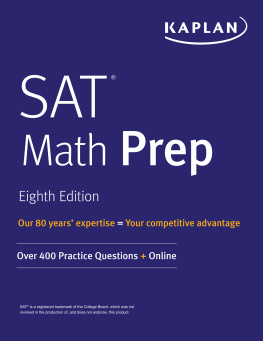Acknowledgments
This book would never have happened without the initiative and continued support of Matt Bardin, who built Zinc Educational Services with true vision, and Margot Herrera at Workman Publishing, for whom the title of senior editor does not begin to suffice. Everyone at Workman has been fantastic, but special thanks are due to Orlando Adiao for his design brilliance, and to Jessica Rozler, Zoe Maffitt, Evan Griffith, and Marta Jaremko for their incredible attention to detail. Ava, Zack, Jon, and Devon, you are battle-tested troopers, terrific editors and writers, great mathematicians, and true comedians.
The book also owes a great deal to the experience and wisdom of everyone at Zinc, but mason jars of gratitude are especially due to Teddy Martin and Sam Levin for their overflowing math brains, and to Will Chancellor for his overflowing everything brain. Many shukrans to Steve Reiss for his math magic, and to Gail Ross for her legal magic. Buckets of appreciation to Larry, Manek, Paul, Michael, and everyone who helped create the Up Your Score series. Forty-ounce Big Gulps of envy and respect to Julian Callos for his superb illustrations. A German stein of appreciation to my sister, Rachel Ramstad, both for her design advice and her unflagging emotional support. And, as always, rooftop water towers of love to Helene Miller, Bill Arp, Lila Gault, and all my lovely and handsome friends.
CA
Thanks to Yi-Yi Tsai for being the foundation and support behind all my endeavors. And to Bill McKenzie for introducing me to Up Your Score: ACT and teaching me (nearly) everything I know.
AC
Many thanks to Tim and Angela Fish for being the most supportive parents a kid could ask for, and to Jake and David Fish for being pretty good, as far as older brothers go. Also to Jed Hilbert of Saint Xavier High School for his advice and encouragement as my standardized test guru.
JF
Thanks to Matt Swafford, Lisa Fitzpatrick, and Xander Swafford for doing the things families do, only better. To Alan Hermanns for irrefutably making my sense of humor what it is today. And to Annabeth, Linus, and Greg, along with Misters E and D. P. et al., for teaching me what I know and therefore was able to apply to the ACT.
ZS
Thanks to Mom and Dad for being the best darn tootin parents a kid could ask for; thanks to Mollie Kerr for not killing me in my sleep; and thanks to Anne Silverman for all the love and support and Wheat Thins. Also, to my friends, for putting up with me singing along to my weird indie music, for watching the TV shows I push on them, and for making my basement a place that will live on in memory.
DK
CHAPTER
Everything You Always Wanted to Know About the ACT
(But Were Afraid to Ask)

For one thing, its three hours and 35 minutes of test-taking deliciousness.
Before We Dive In, Any Questions?
Yeah. First off, do I really have to read this book?
Excellent question. The answer, of course, is no. You can skip reading this book and go take the test without preparation. You will, however, get a lower score and likely be rejected by the college of your choice, attending instead the prestigious Uncle Berts Institute of Shrugging, where you will have the opportunity to major in Nothing and minor in Candy Crush Studies. Or, you can congratulate yourself on picking a book that will carry you to ACT greatness without reducing you to sobs of boredom or dry heaves of despair. After reading this book, you will get a higher score and be accepted to Super Harvard (its located within Harvard University, but its much harder to get into), before moving on to a life of wonder and excitement. The choice is yours.
What are standardized tests and why do colleges love them so much?
The whole point of standardized tests is to provide colleges with an objective assessment of your academic ability. Think about it: Your grades are only as impressive as the school that gives the grades, and your recommendations are only as worthwhile as the teachers giving those recommendations. A standardized test score is important because it is standardized, meaning that everyone takes the same test.
We know that makes the standardized tests sound super important and, thus, super terrifying. But this also means that standardized tests are a great opportunity to improve your college application. The standardized test is just one test (unlike your grades, which reflect all of your classes), and you can improve your score by studying and preparing. In other words, the standardized test pays back huge returns on your investment of time and energy.
What exactly is on the ACT?
The ACT is three hours and 35 minutes of test-taking deliciousness. It begins with an enticing appetizer of an English Test, which covers grammar and style. The English Test asks 75 questions in 45 minutes and is kissed with a delicate foie-gras foam. Then, to cleanse the palate, we get the Math Test, which ranges from pre-algebra to basic trigonometry. This asks 60 questions in 60 minutes and comes with a refreshing arugula salad. Were then served a rich and creamy Reading Test, which includes one long passage or two shorter passages each from Fiction, Humanities, Social Science, and Natural Science and is drizzled with a bacon-and-prune reduction. It asks 40 questions in 35 minutes. And I hope you saved some room, because we still have the Science Test, which can include passages and graphs about Biology, Chemistry, Physics, and Earth and Space Science experiments. This section asks 40 questions in 35 minutes and is crammed full of tender duck meat. In 2005, the ACT added a dessert: an optional Writing Test, in which students are given 40 minutes to write an essay in response to a prompt. This always comes at the end of the test, and it is always made of chocolate.
Classic Rejected ACT Essay Prompts
1. Is caramel too sweet? Discuss.
2. Should I start watching Orange Is the New Black? It just seems like such a commitment.
3. What was the effect of Mikhail Gorbachevs domestic economic policies on contemporary Marxist political philosophy?
4. Are you thirsty? But, like, how thirsty?
The optional Writing Test is a little confusing. We will go into greater detail in the chapter about the Writing section (as well as provide info about recent changes to that test), but well give you a little teaser: Unless youre applying to an engineering program, the Writing section is not really optional. You must eat dessert!
the Writing section is not really optional. You must eat dessert!

 Many engineering programs, including MITs, require the Writing section. So youre still not off the hook.
Many engineering programs, including MITs, require the Writing section. So youre still not off the hook.
Ava
Each section of the test includes questions from multiple subsections. For example, roughly half of the questions on the English Test are about the conventions of standard English, while the other half are focused on rhetorical skills, with the questions all mixed together. Sometimes you wont be able to tell whether you are answering a conventions question or a rhetorical skills question. Does it matter which is which? Of course not! You just have to get it right! We will discuss the different subsections in much greater detail when we get into the relevant chapters for each section. For now, here is a handy chart of the subsections within each section, which you can print out and show to your friends to become the most popular kid in school:






![ACT - The official ACT prep guide, [2018]: [the only official Prep Guide from the Makers of the ACT]](/uploads/posts/book/164684/thumbs/act-the-official-act-prep-guide-2018-the.jpg)

 the Writing section is not really optional. You must eat dessert!
the Writing section is not really optional. You must eat dessert!